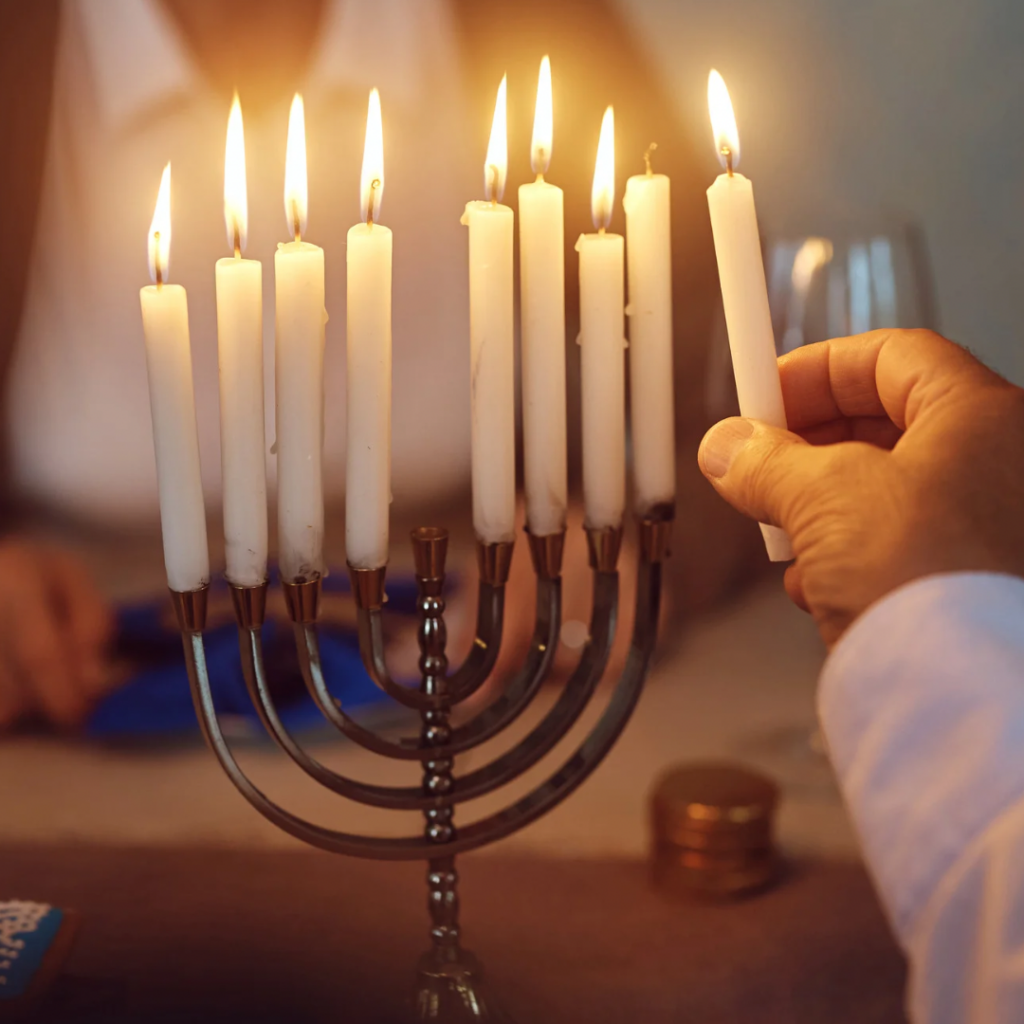
Even if you’re not Jewish or part of a Messianic community, Hanukkah offers rich meaning and traditions that resonate universally, from themes of light and dedication to the celebration of victory and hope.
From lighting the menorah to spinning dreidels and frying latkes, Hanukkah is a time for anyone to reflect on faith, miracles, and the light that shines even in the darkest of times. Who wouldn’t want to be part of that?
My family has been celebrating Hanukkah for years now. While my husband has Jewish heritage (he has a Jewish parent), I don’t. He identifies as a Messianic Jewish believer in Jesus, and I’m a non-Jewish believer in Jesus, but I express my faith through a Messiah centered -Biblically Jewish frame of reference. It’s been such a meaningful journey for us, and in this article, I’ll show you how you can find meaning in Hanukkah, no matter where you come from or what your background is.
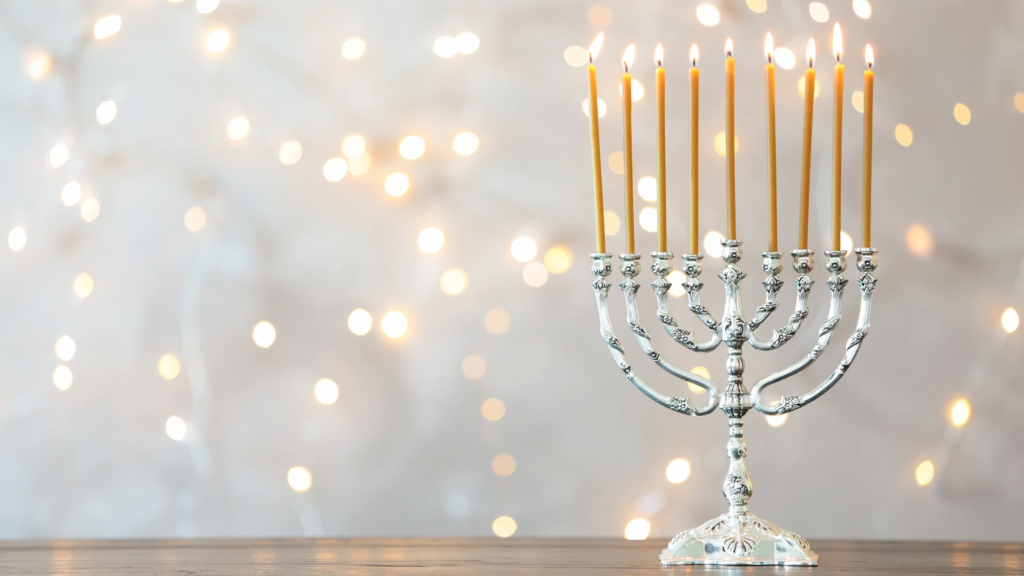
Finding Meaning in Hanukkah
Finding meaning in Hanukkah begins with understanding the origins of the festival. Hanukkah, also known as the Feast of Dedication, is a beautiful light filled celebration deeply rooted in Jewish and biblical history. Many people mistakenly see Hanukkah as a “Jewish alternative” to Christmas, its significance runs far deeper though. The Hebrew word Hanukkah actually means “dedication” which adds to finding meaning.
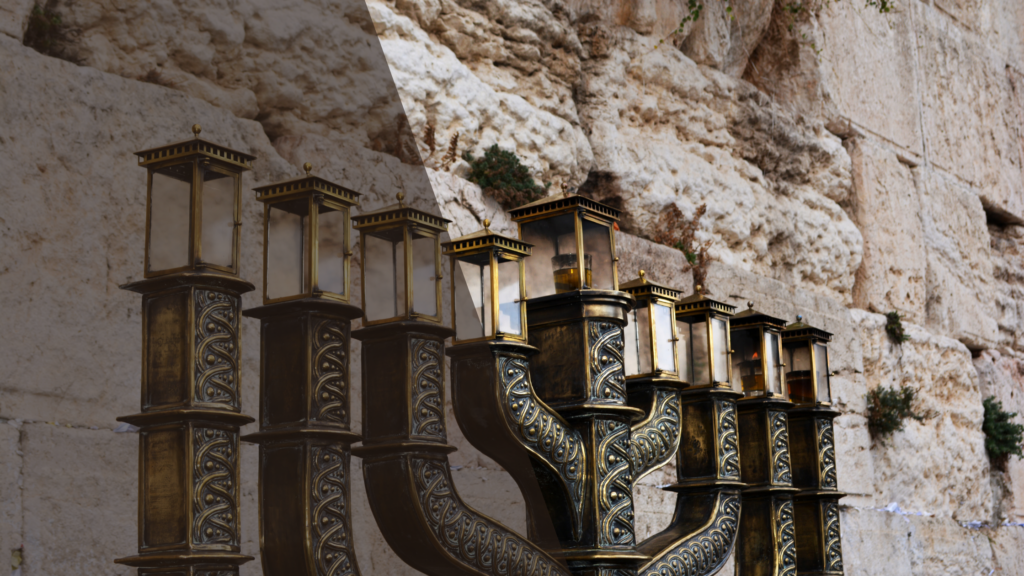
The Background of Hanukkah
Hanukkah means “dedication” and celebrates the rededication of the Second Temple in Jerusalem by Judah Maccabee on Kislev 25, 165 BC. Interestingly, about every 30 years, the traditional date of Messiah’s birth (Christmas) aligns with Hanukkah, as it did this year. Some scholars suggest the connection between Kislev 25 and Hanukkah reflects the correlation between the Messiah’s work and the Maccabees’ actions.
Biblical Reference of Hanukkah
Hanukkah is only mentioned in one place in the Bible: The New Covenant, specifically in John 10. It was prophesied in Daniel, and Yeshua (Jesus) refers to it in Matthew 24:15. However, the actual festival is directly mentioned only in the Good News according to John.
Yeshua (Jesus) the Messiah identifies with this holiday as seen in John 10:21, which centers on the cleansing of the temple. This parallels His ministry: the Messiah came to cleanse us of sin. Just as the temple was cleansed, we, as the temple of God, are cleansed through His sacrifice. Hanukkah reflects His mission.
They Eight Days of Hanukkah: Hanukkah is celebrated for eight days. Jewish tradition from the Talmud says that when the Maccabees relit the Temple menorah they found only enough consecrated oil for one day. Miraculously, the oil burned for eight days—long enough to prepare more oil. This miracle is at the heart of the Festival of Lights, symbolized by the lighting of the Hanukkiah, a nine-branched menorah. However, this legend actually arose later. According to 2 Maccabees, the eight-day celebration was inspired by Sukkot, as the Maccabees could not properly celebrate the Feast of Tabernacles at the time.
The Historical Context of Hanukkah
Hanukkah marks the triumph of the Maccabees, a small group of Jewish freedom fighters, over the vastly superior forces of the Syrian king Antiochus Epiphanes. Their victory ensured the survival of Jewish identity and worship during a time of harsh persecution.
Years before the temple’s rededication, the Syrian king Antiochus Epiphanes (“God manifest”) sought to Hellenize the world. He prohibited Jewish practices and desecrated the Second Temple by sacrificing a pig to Zeus on the altar, creating the “abomination of desolation” prophesied in Daniel and referenced by Yeshua in Matthew.Antiochus forced Jewish men to sacrifice pigs on altars throughout the region. A defiled temple was unfit for worship in God’s eyes, prompting the Maccabees to start a grassroots revolt. Against all odds, this small group of freedom fighters defeated the powerful Syrian army, reclaimed the temple, and rededicated it to the Lord.
He forced Jewish men to sacrifice pigs on altars throughout the region. A defiled temple was unfit for worship in God’s eyes, prompting the Maccabees to start a grassroots revolt. This uprising, was called the Maccabean Revolt. Against all odds, this small group of freedom fighters defeated the powerful Syrian army, reclaimed the temple, and rededicated it to the LORD God to make it fit for worship.
The Spiritual Meaning of Hanukkah
Why Did the Maccabees Bother? Why did the Maccabees fight so fiercely to cleanse the temple? Dr. Sam Nadler (a messianic Jewish man and rabbi) explains it this way in one of his sermons.
“The Temple and Tabernacle reflected the heavenly temple Moses discovered. A defiled temple misrepresented heaven and was unsuitable for worship. The heavenly house of God must be consecrated for holy worship. The Maccabees understood this and fought to restore the temple’s sanctity.
Hanukkah means dedication. The root word, “chanuk,” also applies to sons, servants, and sanctuaries. Dedication involves narrowing and focusing one’s life on God. Understanding this is vital to honoring Him in all we do. As His sons, servants, and sanctuaries, we are called to dedicate our lives to the One true God. Hanukkah commemorates this.
Why Does This Matter? “God created you to be His holy temple. Your purpose in life is found in your relationship with Him. Without knowing God, people often invent purposes to fill the void left by sin and defilement.
The Messiah came to cleanse us of sin, making us fit to be temples of the Holy Spirit. Without the cleansing blood of the Lamb, there is no atonement. Yeshua’s identification with Hanukkah in John 10 highlights the importance of true cleansing—both of the temple in Jerusalem and of our hearts.”
The Messianic Significance of Hanukkah
Many like to say that if there wasn’t first a Hanukkah, we wouldn’t be able to celebrate the birth of Jesus who was born Jewish. The origin of Hanukkah was to preserve Jewish identity, and Jesus, being Jewish, is at the center of that story.
Messianic Jews and Christian find a deeper meaning in Hanukkah through John 10, the only place in the Bible where Hanukkah is mentioned. In John 10:22-24, Jesus attends the Feast of Dedication, connecting the themes of Hanukkah to the ultimate spiritual deliverance. While the Maccabees fought for freedom from political oppression, Yeshua (Jesus) demonstrated freedom from sin, offering Himself as the “Light of the World” John 8:12 and the “Good Shepherd.” The Hanukkah miracle of light and rededication points to the victory over evil through Messiah. In the same chapter, Yeshua also declares, “I and the Father are one” (John 10:30), revealing His divine unity with God and affirming His role as the fulfillment of the light that shines into the darkness, bringing spiritual freedom to all.
The celebration reflects Jesus’ words, “I am the light of the world” (John 8:12). You can read about Yeshua’s (Jesus’) Hanukkah message written by a Messianic Jewish Scholar Dr. Sam Nadler here.
The Traditions and Customs of Hanukkah
There are many customs surrounding Hanukkah which can either be a wonderful way to reflect the truth of scripture or commemorate some of the history and background of Hanukkah.
Lighting the Hanukkah Menorah (Hanukkiah)
The Hanukkah menorah, or Hanukkiah, holds nine candles: eight for the nights of Hanukkah and the shamash(pronounced shah-MAHSH) is the helper or servant candle.
Candles are placed from right to left but lit from left to right, starting each night with the newest candle. Many Messianic believers see the Shamash as pointing to Messiah Yeshua (Jesus), whom scripture describes as the suffering servant and the true light that enlightens every person. Blessings and are said after the lighting of the Shamash candle then the number of candles for the specific day is lit using the Shamash candle. The blessings and the lighting emphasizes God’s deliverance and faithfulness, making this a meaningful time for reflection and devotion by the warm glow of the candles.
Hanukkah Blessings (Messianic Version)
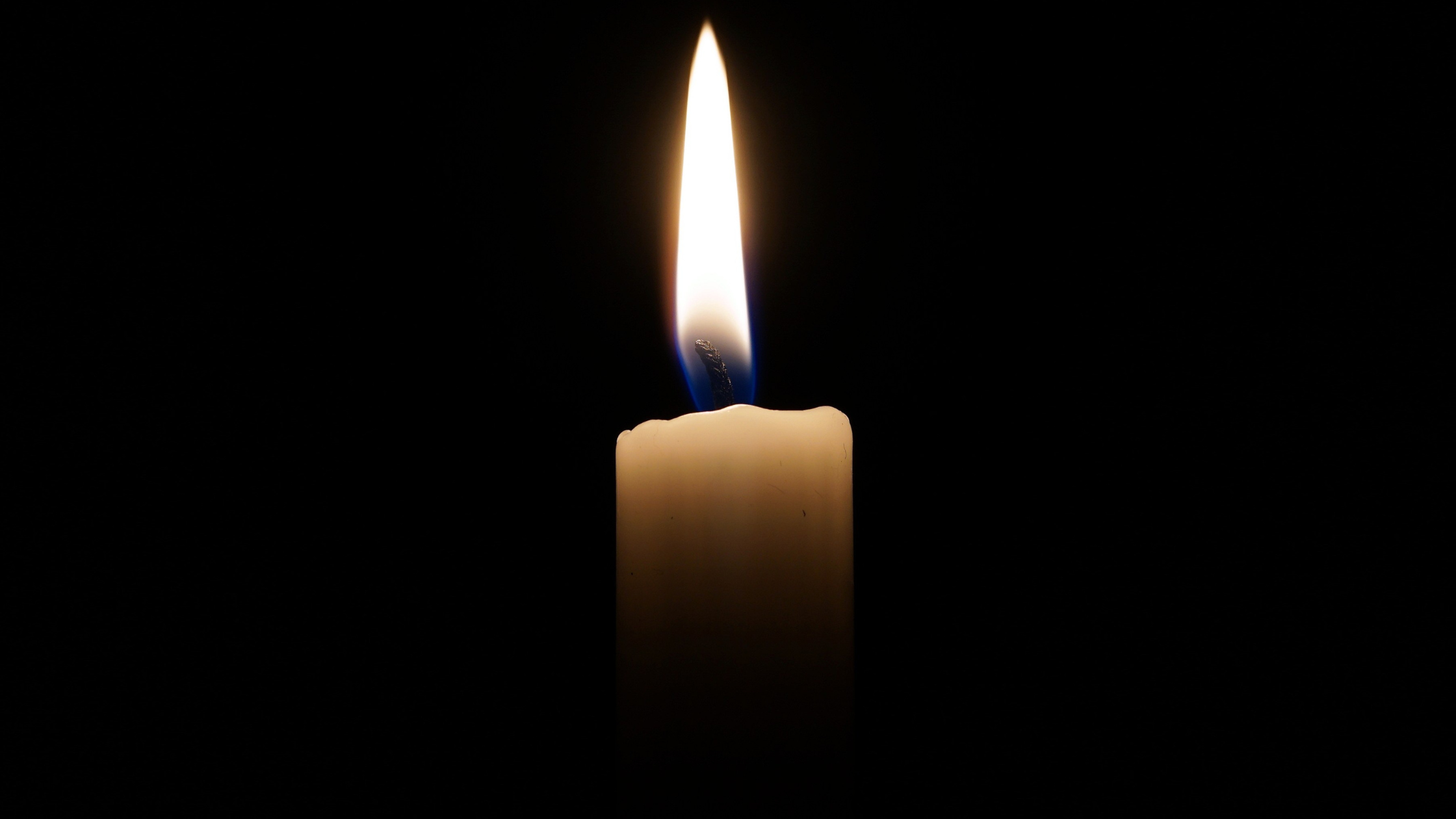
First Hanukkah Blessing
HEBREW TRANSLITERATION
ENGLISH
Blessed are You, O LORD our G-d, King of the Universe who has sanctified us through faith in Yeshua the Messiah, the Light of the World, and in his name we kindle the Chanukkah lights.

Second Hanukkah Blessing
HEBREW TRANSLITERATION
Baruch atah Adonai, Eloheinu Melech Ha-Olam, she-asa nisim La-avoteinu, ba-yamim ha-hem, bazman, ha-zeh.
Blessed are you, LORD our G’d, King of the Universe, who made miracles happen for our forefathers, in those days at this season.

Third Hanukkah Blessing (First Night Only)
HEBREW
Baruch atah Adonai, Eloheinu Melech Ha-Olam, Shehe-chiyanu, Ve-kiyemanu, Vehigi-anu, Lazman hazeh!
Blessed are you, LORD our G’d, king of the Universe, who has kept us alive, sustained us, and brought us to this season.
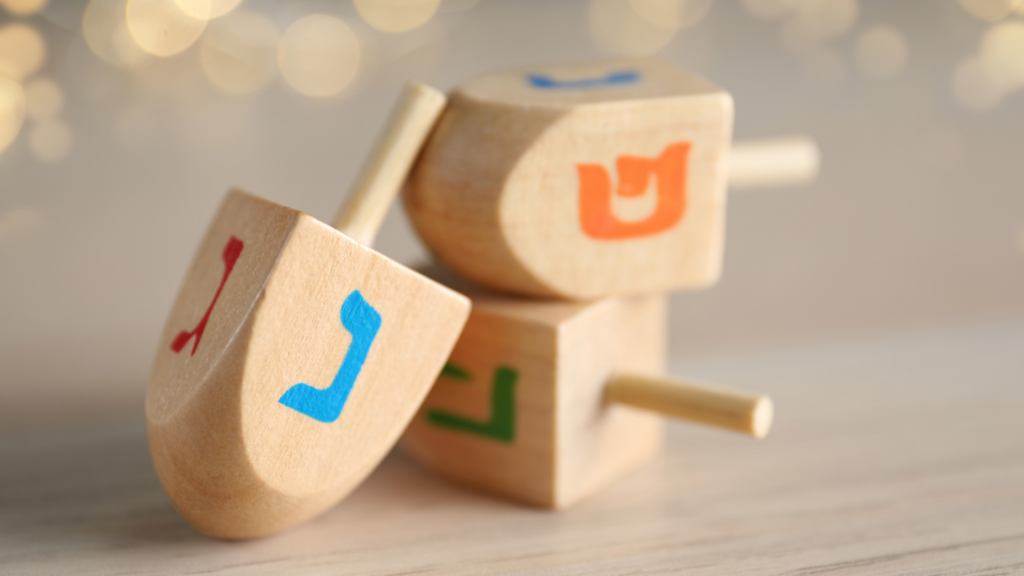
Playing Dreidel
The dreidel, a spinning top with Hebrew letters. The Hebrew Letters each stand for a word in the phrase: A Great Miracle Happened There or in Israel a Great Miracle Happened Here. The game is often played for chocolate coins (gelt). You can find video instructions of how to play dreidel here

Eating Customary Foods
Traditional foods like latkes (potato pancakes) and sufganiyot (jelly-filled doughnuts) honor the miracle of the oil through culinary tradition.
Singing Songs
Hymns like Maoz Tzur (“Rock of Ages”) are sung, celebrating God’s protection. I also adore Marty Goetz’s Chanukkah song.
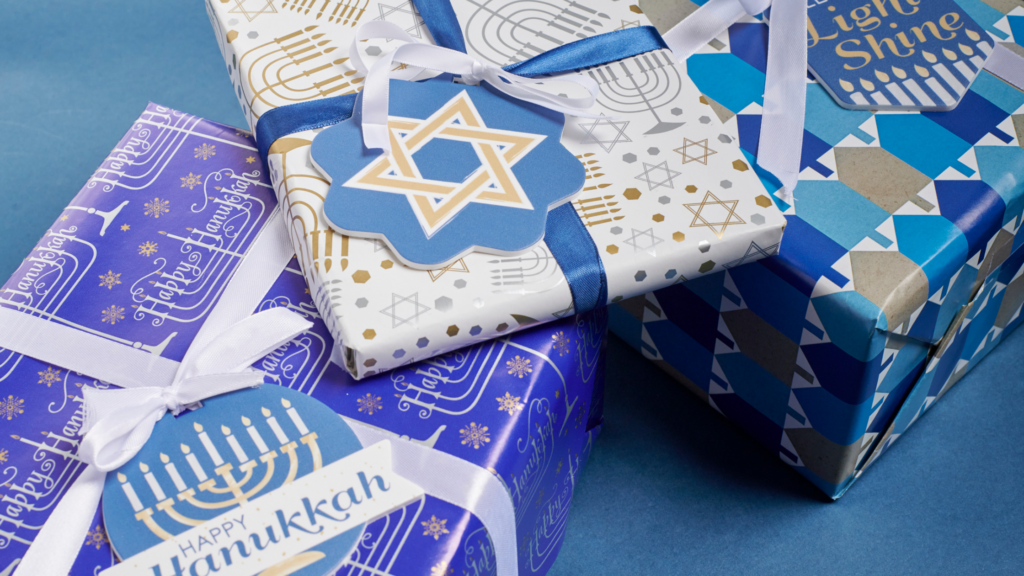
Gift Giving
The custom of gift-giving at Hanukkah likely began as the tradition of giving gelt (money or coins) to children, a practice that dates back to the Talmud. Over time, especially in Jewish-American communities, it evolved into giving gifts, influenced in part by the commercialization of Christmas. While gifts were once mostly symbolic, today they are a way for families to celebrate together, keeping with the spirit of the holiday’s focus on light, deliverance, and gratitude. You can read more about the history HERE.
Why Acknowledge Hanukkah if You Are Not Jewish?
Acknowledging Hanukkah, even if it is not one of the Feasts of the Lord mentioned in Leviticus, holds spiritual significance for many Christians, Messianic Jews, and Messianic Gentiles for some of the following reasons:
Connection to Jewish Roots: Hanukkah commemorates the rededication of the Second Temple in Jerusalem, an event central to Jewish history. For Christians and Messianic Jews, recognizing this history helps deepen the understanding of Jesus’ Jewish heritage, as He Himself observed the Festival of Dedication (John 10:22-23). Acknowledging Hanukkah connects believers to the broader story of God’s faithfulness to Israel.
Spiritual Significance of Light: Hanukkah emphasizes the miracle of the oil, where a small amount of oil miraculously burned for eight days in the menorah, symbolizing God’s provision and intervention in times of crisis. For Messianic Jews and Christians, the themes of light and miracles resonate with the message of Jesus, who is described as the “Light of the World” (John 8:12). Celebrating Hanukkah allows believers to reflect on God’s faithfulness and provision, a theme that transcends the holiday itself.
Encouragement of Unity: Acknowledging Hanukkah fosters a deeper sense of unity with the Jewish community, showing solidarity with the people of Israel. This can be especially important for Gentile Christians and Messianic Jews who believe in the biblical principle of being “grafted in” (Romans 11:17-18), acknowledging their connection to the commonwealth of Israel.
Spiritual Preparation and Dedication: While Hanukkah is not a biblical feast mandated by God, its themes of rededication and the purification of the temple are spiritually meaningful. For Messianic Jews and Christians, these themes align with the idea of spiritual renewal and dedication to God, similar to other moments of rededication found in Scripture, like the dedication of Solomon’s temple (1 Kings 8:63-66).
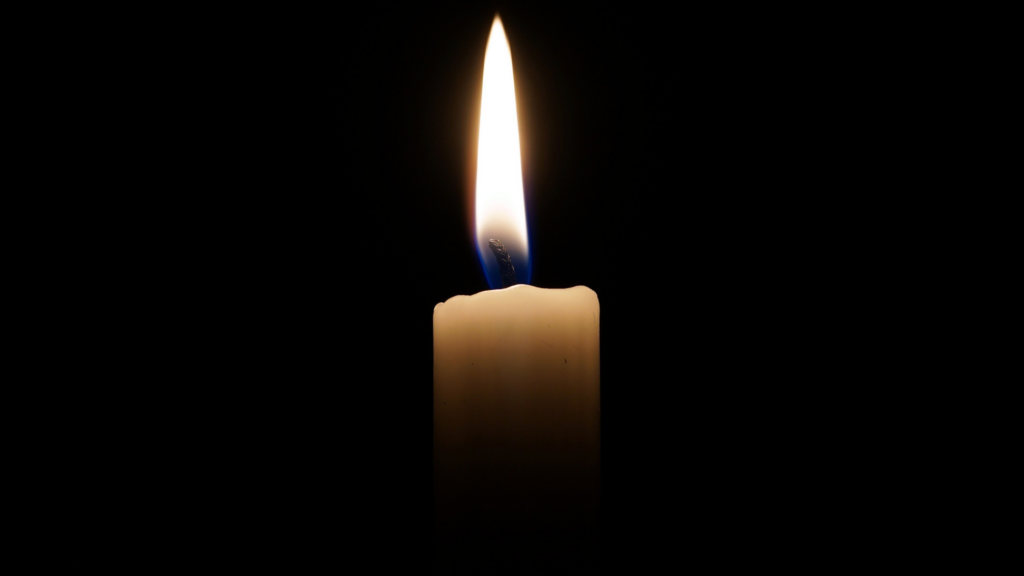
Embracing the Light of Hanukkah
Hanukkah is more than just a celebration of oil and light—it’s a reminder of faith, rededication, and God’s miraculous provision. For Messianic believers, it’s a time to reflect on how the light of Messiah illuminates our world and gives us hope, even in the darkest of times and an opportunity to dedicate for the first time or rededicate our lives to him.
What about you? As you celebrate this season, what does Hanukkah mean to you? How can you carry the light of hope and redemption into your own life? I’d love to hear your thoughts and stories in the comments below.
If you found this post helpful, don’t forget to share it with others who might benefit from a deeper understanding of Hanukkah!
Hanukkah FAQ: Answers to Your Most Common Questions
Why are there 9 candles on the Hanukkah menorah?
The Hanukkah menorah, or Hanukkiah, has 9 branches—eight for each night of Hanukkah and one for the Shamash (the “servant” candle). The Shamash is used to light the other candles, symbolizing the central role of the Messiah, who is often seen as the “servant” light of the world.
Why do we celebrate for 8 nights?
Hanukkah’s eight days come from two beautiful traditions. Historically, the Maccabees celebrated the rededication of the Temple for eight days, inspired by the biblical festival of Sukkot, which they had missed during the war. Later, the Rabbis taught that Hanukkah lasts for 8 nights to commemorate the miracle of the oil. After reclaiming and rededicating the Second Temple, the Maccabees only found enough consecrated oil to last one day. Miraculously, it burned for 8 days, long enough for them to prepare more oil.
What Type of Holiday is Hanukkah?
Hanukkah is a major Jewish holiday like Purim and not a biblical feast of the LORD like Passover, Rosh Hashanah or Sukkot as found in Leviticus 23.
Why are there so many ways to spell Hanukkah in English? Which is correct Hanukkah or Chanukkah?
Both “Hanukkah” and “Chanukkah” are acceptable spellings. The variations arise from different transliterations of the Hebrew word, which has sounds not found in English. Some prefer “H” to reflect a softer pronunciation, while others use “Ch” to capture the guttural “chet” sound in Hebrew. You can read a more detailed explanation here
Why is Hanukkah usually celebrated in December?
Hanukkah generally falls in December, though the date varies because it follows the Hebrew lunar calendar, which is different from the Gregorian calendar. The Hebrew calendar is lunar as opposed to the solar Gregorian calendar. Because of this, Hanukkah can fall on the Kislev 25-Tevet 2 or 3 on the Hebrew calendar or it can fall in November or December on the Gregorian calendar.
Is Hanukkah found in the Bible?
Hanukkah is not found in the Old Testament. Hanukkah events happened during the inter-testmental period. The only place in Bible where it is found is in John 10:22-39 where Jesus is found identifying with Hanukkah or the Feast of Dedication.
What is the meaning of the Dreidel game?
The dreidel game is often played during Hanukkah, and its four Hebrew letters (Nun, Gimel, Hei, Shin) stand for “Nes Gadol Haya Sham,” meaning “A Great Miracle Happened There.” In Israel, the dreidel has a Pe instead of Shin, meaning “A Great Miracle Happened Here.

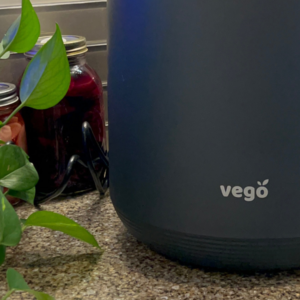
Leave a Reply
You must be logged in to post a comment.